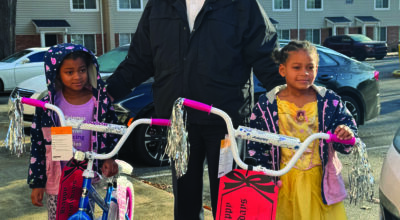On the border-day 2-Quinac, human rights activist
Published 12:00 am Wednesday, December 2, 2009
I met Sebastian Quinac in Tucson, Ariz., where he shared his story about his own journey to the United States and his life’s work as a human rights activist.Sebastian Quinac is unassuming and soft-spoken, quite unlike the vigilante groups he’s encountered several times in Tucson.
Quinac, a human rights activist and Immigration and Border Coordinator at the American Friends Service Committee in Tucson, Ariz., often attends rallies and conferences about the human and workplace rights of immigrants.
He said that sometimes vigilantes attend these same events.
“In the University of Arizona, we were about to start talking about human rights in Mexico and the United States in the Spanish language when a group of people just stood up and started saying, ‘No! This is America, speak English!’ ” he said.
The conference that day at the University of Arizona was canceled, he said.
As an employee of the American Friends, the nonprofit, social justice arm of the Quaker faith, Quinac tries to educate immigrants about their workplace and labor rights. He also spends a lot of time in the community, talking with people, listening to their concerns and meeting with other organizations.
He said the Minutemen and others have no reason to be afraid of the Spanish language, or any other language.
“If you are willing to keep who you are and to be proud of your own language and your own culture and living with other communities, you will not lose your own language,” he said. “That’s just an excuse they (vigilantes) use.”
Sebastian Quinac is tri-lingual. He speaks a Mayan language (there are 23) as his mother tongue, Spanish and English. In addition to writing poetry in his Mayan language, he is an active part of the Mayan community in Tucson.
As a young man in Guatemala, Quinac worked organizing bilingual Spanish-Mayan language education in his home Mayan village. In the early 1980s, the government cracked down violently on indigenous communities and the Catholic Church, who were advocating Mayan rights. When three of his fellow activists were murdered and four were kidnapped in 1983, Quinac left Guatemala and crossed the border into the United States at San Diego. Now he has his citizenship.
On another occasion, Quinac said vigilantes showed up at an immigrant rights rally he attended on April 10, 2007. A Minuteman group began burning a Mexican Flag in front of a largely Latino crowd.
Minutemen groups and other similar border vigilante organizations, using a lexicon of buzz words like “invasion” and “intruder,” propagate an atmosphere of palpable antagonism in the borderlands. Their presence is concentrated in the vast Sonoran desert south of Tucson, where an estimated 52 percent of illegal immigrants cross into the United States.
Across the country, anti-Latino hate crimes increased by 35 percent between 2003 and 2006, according to the FBI.
“A lot of people talk about the wall, about ‘stop the immigration’ and ‘stop this’ and ‘stop that,’ but they never think about globalization,” Quinac said.
Because of his own experience in Guatemala, Quinac said he understands how economic disruption and poverty in Latin America contributes to the complex issue of illegal immigration in the United States.
“Huge companies have taken big pieces of land from the poor people in Guatemala. So they have to leave their regions because they cannot grow corn, beans or vegetables to survive. They sell their piece of land and home and have to cross the border,” he explained. “They come here to die.”
At least 136 Guatemalans died last year trying to cross into the United States (Mi Gente, July 23.)
“This is happening because of economic globalization,” he said. “The modern economy is killing people in different ways.”
The Coalition of Human Rights in Tucson estimates as many as 5,000 people have died trying to cross the U.S. border since the mid 1990s.
Around the time the North American Free Trade Agreement (NAFTA) was implemented in 1994, border crossings began to steadily increase. The Pew Hispanic Center estimates the annual number of immigrants from Mexico increased by more than 61 percent in the first eight years of NAFTA.
Because of new urban fence and enforcement initiatives, the flow of human migration has shifted from urban centers to remote desert, where the number of migrant deaths has risen steadily since the mid ’90s.
In 2007, Pima County near Tucson registered its highest number of immigrant deaths on record.
Quinac can’t accept this.
The issue is so much more than political, he said. The increasing number of desert deaths signals a grave humanitarian crisis.
Quinac and other human rights activists often journey to the desert to search for lost or missing immigrants who have been separated from their group.
“I once came across a Guatemalan lady, age 28, who died in the desert under the heat. When I saw her lying down over the dry cactus and shrubs, I thought that she shouldn’t have left Guatemala and she shouldn’t have come here,” Quinac said.
“At the same time, I knew there was a reason this lady decided to risk her life. It is because of the economic situation in Guatemala.”
On another occasion, Quinac met a Guatemalan man who had just arrived in Tucson. The journey he dreamed would be the solution to his family’s destitution in Guatemala turned into a nightmare ó it almost killed him. He was Mayan too.
“He was crying and said, ‘Now, I am completely lost because I sold my piece of land. I had to move my wife and four children to my mother-in-law’s and left them with nothing, not even a piece of firewood to cook their food.’ ”
The man had promised his family he would come to work in the United States and send them money. But he almost died in the desert and thought that he might never see his family again.
The man decided to return to his family in Guatemala.
Quinac does not support the construction of a border fence. He’d rather see Americans use their resources to support immigration solutions and policies that result in fair trade with Latin America.
Such policies should affirm the rights of people to live in their home countries and the right to work ó two basic human rights recognized by international law.
“We need to work on an educational campaign about globalization and economics … about what it is doing to people in other countries,” Quinac said. “We need to come together and make a good plan for economics for all families.”
In recent months, Quinac has begun new initiatives toward this goal. In collaboration with the University of Arizona Law School, he helped organize a legal advice clinic for women workers who are unsure about their rights. Often, they have been denied pay or suffered abuse at work.
“If you believe that every person has dignity, that is important,” he said. “I hope we can work to build that multicultural society in the U.S. with no hate.”
Coming Monday: Plenty has changed for residents living on either side of the border.




